A new report by JOANGOHutan, the Malaysian Network of Indigenous Peoples and Non-Governmental Organizations, paints an atmosphere of abuse and ambivalence toward indigenous communities embroiled in land disputes in the Malaysian state of Sarawak on the island of Borneo.
According to the report, there are currently 140 land dispute cases in limbo in the Sarawak courts. Indigenous groups are fighting loggers, oil palm plantation developers, and the paper industry for their tribal lands, yet indigenous tribes have not found advocates in state government.
“It frequently happens that rather than ensuring the law is being upheld, local authorities, police and loggers act in collusion to harass and intimidate indigenous communities,” the 40 page report reads.
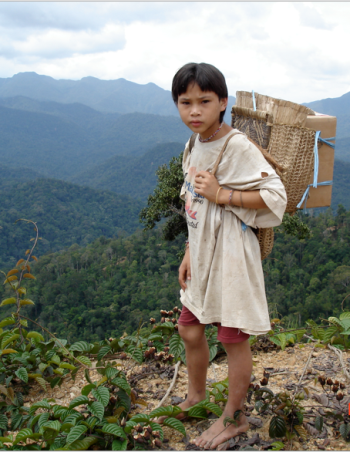 A new report alleges that Sarawak’s natives have had little benefit from logging despite development promises by the state authorities. Copyright: Bruno Manser Fonds, which works with forest tribes in Sarawak. |
Even when indigenous communities win legal cases against developers, the report states that state governments largely ignores the rulings. For example, the Iban indigenous tribe won a landmark ruling in 2001 that stated that indigenous communities have customary rights over their primary rainforests, yet the Iban have been fighting industrial interests ever since. In January of this year, 25 Iban homes were demolished by state police without prior notice.
Another indigenous group, the Penan, have also long struggled to have their rights over tribal lands respected. For example, an independent review found that Interhill Logging, a Sarawak-company, had abused the rights of the Penan people. According to the report Interhill Logging was conducting unsustainable logging of the rainforest and that there was “no inherent long-term development advantage” for the Penan people. Compensation for deforestation was given arbitrarily to the Penan and not recorded by the company. Worse incidences have also occurred. In 2008 an indigenous leader was allegedly murdered for his opposition to logging. More recently, the Sarawak government confirmed that a number of Penan girls were abused, molested, and raped by loggers.
In response to this situation, JOANGOHutan is calling on the European Union not to sign a timber trade agreement with Malaysia unless it “includes a mechanism that forces the Malaysian Government to recognize the rights of indigenous peoples.” The agreement should also ensure that the state government “must uphold and implement all recent court judgements”.
“We urge the Malaysian government and the European Union to ensure that any agreement is based on procedures in accordance with existing national and international human rights laws and instruments recognising the rights of indigenous peoples.” Wong Meng Chuo, Director of JOANGOHutan, said in a press release.
Malaysia is the world’s largest exporter of tropical timber and the second-largest producer of palm oil.
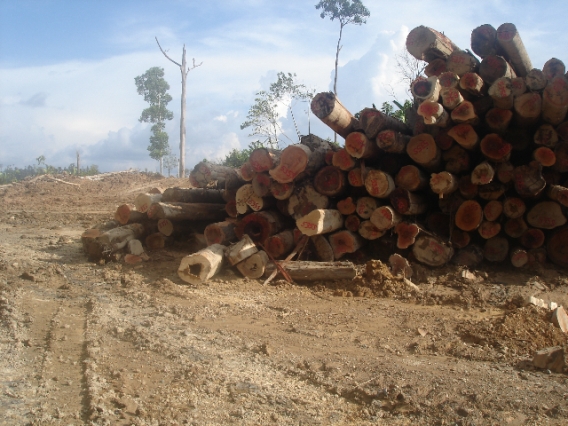
Sarawak logs are often harvested on native lands without the consent of the indigenous population. Copyright: Bruno Manser Fonds, which works with forest tribes in Sarawak.
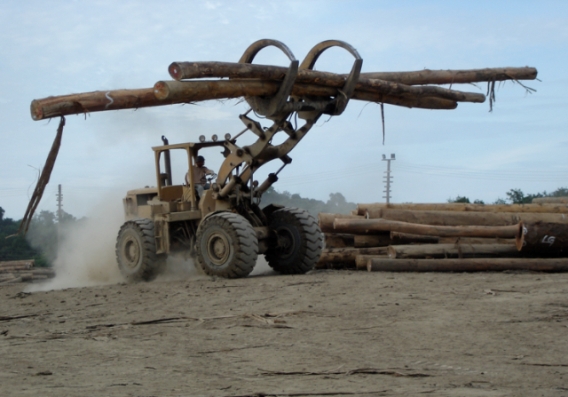
In 2008, Sarawak timber exports atained a value of 7.4 billion Malaysian Ringgits (2.3 billion US $). Copyright: Bruno Manser Fonds, which works with forest tribes in Sarawak.
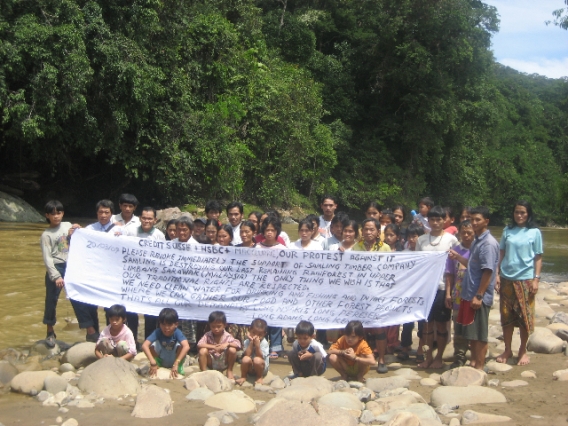
: Protests against logging by Sarawak’s indigenous communities have mostly been disregarded by the state government. Copyright: Bruno Manser Fonds, which works with forest tribes in Sarawak.
Related articles
Malaysian palm oil grower loses case over damages to rainforest community
(04/01/2010) IOI group suffered a legal setback this week when the Miri High Court — a court for Miri District in Sarawak, a state in Malaysian Borneo — ruled that the palm oil grower is liable for damages caused by the destruction of land belonging to Long Teran Kanan, a Kayan native community. The legal battle has dragged on for 12-years but now represents an important precedent for forest-dependent communities in Malaysia, reports the Bruno Manser Fund, an NGO that campaigns on behalf of Sarawak’s forest people.
Real-life Avatar: court blocks destruction of indigenous community in Borneo

(01/27/2010) A court in the Malaysian state of Sarawak has issued an injunction to block the continued destruction of the Iban village of Sungai Sekabai, reports the Bruno Manser Fund (BMF), an indigenous rights groups. Last week Sarawak state police demolished 39 Iban homes in a dramatic escalation of land dispute between the community and a state-backed palm oil developer.
Indigenous in Borneo win “landmark” court ruling over land rights
(01/21/2010) A Malaysian court has ruled in favor of indigenous communities in a dispute over land rights just two days after authorities “arbitrarily” destroyed 25 Iban homes in the village of Sungai Sekabai in Sarawak (Malaysian Borneo), reports the Bruno Manser Fund, a rights group.
Malaysian police destroy homes in Borneo indigenous community
(01/20/2010) Malaysian authorities yesterday destroyed two dozen homes in an indigenous Iban community near the town of Bintulu in Sarawak, alleges a human rights group.
Malaysia and China agree to $11 billion deal to build mines, dams in Borneo
(01/13/2010) Malaysia and China today agreed to am $11 billion deal that will turn a vast area of Sarawak, a Malaysian state in northern Borneo, into an industrial corridor for mining and energy development, reports The Financial Times.
Dams a ‘monument of corruption’: Baru Bian, new leader of Sarawak’s People’s Justice Party
(01/12/2010) In an interview with the Bruno Manser Fond, the new leader of the Malaysian state Sarawak’s People’s Justice Party (PKR), Baru Bian, spoke out against the state government’s plans for mega-dams in the middle of the rainforest, as well as continued rainforest destruction and corruption.
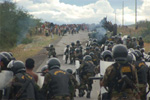
(12/22/2009) In James Cameron’s newest film Avatar an alien tribe on a distant planet fights to save their forest home from human invaders bent on mining the planet. The mining company has brought in ex-marines for ‘security’ and will stop at nothing, not even genocide, to secure profits for its shareholders. While Cameron’s film takes place on a planet sporting six-legged rhinos and massive flying lizards, the struggle between corporations and indigenous people is hardly science fiction.
Malaysia to allow logging in indigenous ‘peace park’ to proceed
(12/17/2009) Malaysia, the country with the fastest rate of greenhouse gas emissions growth since 1990 among middle and upper income countries, will allow logging to proceed in a contested rainforest area in Sarawak, on the island of Borneo.
Rainforest tribe sues the Malaysian government for enabling deforestation
(12/10/2009) Five Penan rainforest communities are suing the Sarawak state government and the Malaysian timber giant Samling for violation of their native customary rights, reports the Bruno Manser Fund, a group that works on behalf of indigenous groups in Malaysia.
Malaysian land minister attacks credibility of young indigenous rape victims
(12/07/2009) Speaking to the BBC, James Masing, Sarawak Minister for Land Development, dismissed claims by Penan girls and women who said they had been sexually abused and raped by logging workers in a remote jungle area.
Rainforest tribe declares ‘peace park’ to defend lands from logging in Sarawak
(11/30/2009) In an attempt to block destructive logging of their traditional land, a group of indigenous Penan has declared a “peace park” in the Upper Baram region of Sarawak in Malaysian Borneo, reports the Bruno Manser Fund.
Fifteen indigenous leaders arrested in Borneo for protesting dams that would flood their lands
(09/16/2009) After attempting to send a memorandum of protest against two dam proposals to the Sarawak Chief Minister Taib Mahmud, fifteen indigenous leaders were arrested in Kuching, Sarawak, reports the non-governmental organization the Burno Manser Fund.
Independent review finds logging company has abused rights of indigenous Penan in Borneo

(09/15/2009) An independent review of Interhill Logging found that the Sarawak logging company has regularly violated forest laws and abused the rights of the indigenous Penan peoples. The review, conducted by French tourism giant ACCOR, found that Interhill Logging had not received free, prior, and informed consent from the local Penan people for its logging operations; the logging being done by Interhill “is very definitely not sustainable”; the company is not fully compiling with Sarawak’s Natural Resources and Environment Board; and Interhill is providing no long-term benefits to the Penan peoples.
Power, profit, and pollution: dams and the uncertain future of Sarawak
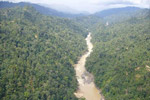
(09/03/2009) Sarawak, land of mystery, legend, and remote upriver tribes. Paradise of lush rainforest and colossal bat-filled caves. Home to unique and bizarre wildlife including flying lemurs, bearcats, orang-utans and rat-eating plants. Center of heavy industry and powerhouse of Southeast Asia. Come again? This jarring image could be the future of Sarawak, a Malaysian state on the island of Borneo, should government plans for a complex of massive hydroelectric dams comes to fruition. The plan, which calls for a network of 12 hydroelectric dams to be built across Sarawak’s rainforests by 2020, is proceeding despite strong opposition from Sarawak’s citizens, environmental groups, and indigenous human rights organizations. By 2037, as many as 51 dams could be constructed.
Penan tribe to continue blockade against loggers with blowpipes and spears
(09/01/2009) A meeting between the Penan indigenous tribe, Malaysian government officials, and representatives of a logging company ended without an agreement on Friday. After the meeting, a Penan spokesman declared that the group’s blockade would continue. Blockaders, dressed in traditional garb, have armed themselves with blowguns and spears.